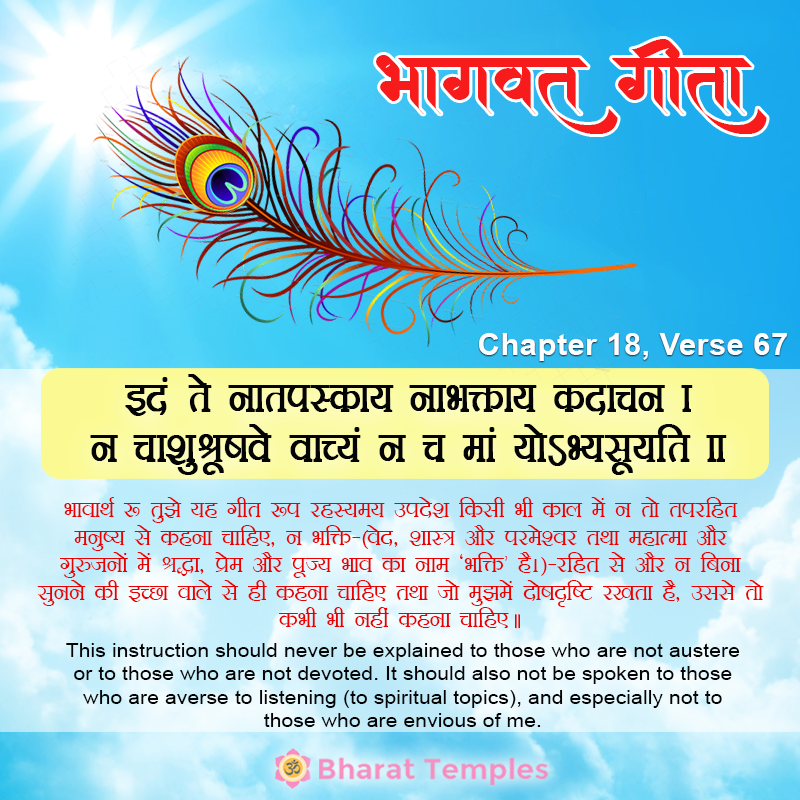Contents
इदं ते नातपस्काय नाभक्ताय कदाचन |
न चाशुश्रूषवे वाच्यं न च मां योऽभ्यसूयति ||
idaṁ te nātapaskyāya nābhaktāya kadāchana
na chāśhuśhruṣhave vāchyaṁ na cha māṁ yo ‘bhyasūtayi
भावार्थ:
भावार्थ : तुझे यह गीत रूप रहस्यमय उपदेश किसी भी काल में न तो तपरहित मनुष्य से कहना चाहिए, न भक्ति-(वेद, शास्त्र और परमेश्वर तथा महात्मा और गुरुजनों में श्रद्धा, प्रेम और पूज्य भाव का नाम ‘भक्ति’ है।)-रहित से और न बिना सुनने की इच्छा वाले से ही कहना चाहिए तथा जो मुझमें दोषदृष्टि रखता है, उससे तो कभी भी नहीं कहना चाहिए॥67॥
Translation
This instruction should never be explained to those who are not austere or to those who are not devoted. It should also not be spoken to those who are averse to listening (to spiritual topics), and especially not to those who are envious of me.
English Translation Of Sri Shankaracharya’s Sanskrit Commentary By Swami Gambirananda
18.67 Idam, this Scripture; which has been taught by Me te, to you, for your good, for terminating mundane existence; an vacyam, should not be taught (-na is connected with the remote word vacyam-); atapaskaya, to one who is devoid of austerities. It should kadacana, never, under any condition whatsoever; be taught abhaktaya, to one who is not a devotee, who is devoid of devotion to his teacher and God, even if he be a man of austerity. Neither should it be taught even asurusave, to one who does not redner service-even though he may be a devotee and a man of austerity. Na ca, nor as well; to him yah, who; abhyasuyati, cavils; mam, at Me, at Vasudeva-thinking that I am an ordinary person; to him who, not knowing My Godhood, imputes self-adulation etc. to Me and cannot tolerate Me. He too is unfit; to him also it should not be imparted.
From the force of the context it is understood that the Scripture should be taught to one who has devotion to the Lord, is austere, renders service, and does not cavil. As to that, since it is seen (in a Smrti)-‘to one who is intelligent or to one who is austere’-that there is an option between the two, it follows that this should be imparted either to an austere person given to service and devotion, or to an intelligent person endowed with them. It should not be imparted to an austere or even an intelligent person if he lacks service and devotion. It should not be taught to one who cavils at the Lord, even though he be possessed of all the good alities. And it should be taught to one whoserves his teacher and is devout. This is the rule for transmitting the Scripture.
Now the Lord states the fruit derived by one who transmits the Scripture:












